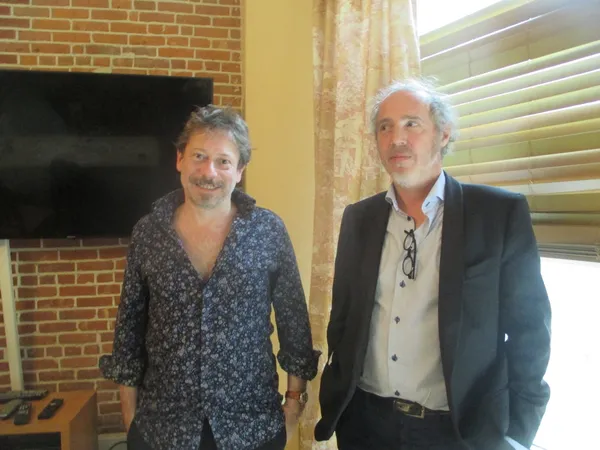In the final installment of my conversation with the Ismael’s Ghosts: Director’s Cut (Les Fantômes D'Ismaël) director Arnaud Desplechin and his longtime star Mathieu Amalric (My Golden Days, La Sentinelle, Un Conte De Noël, Rois Et Rein, My Sex Life... or How I Got into an Argument, Jimmy P: Psychotherapy of a Plains Indian), we discuss the dance scene between Charlotte Gainsbourg and Marion Cotillard, Mathieu's performance of the theme from Alfred Hitchcock's Marnie, composer Grégoire Hetzel, the modesty of Ivan Dedalus (Louis Garrel), John Gielgud's character in Alain Resnais' Providence, and what could be the opposite of a scene from Woody Allen's Bananas.
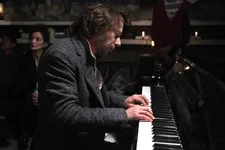 |
| Arnaud Desplechin on Mathieu Amalric as Ismael: "I like that we can see you play the theme from Marnie, the Hitchcock film." |
In our dreams the dead return casually, without warning and little fanfare. An old stained looking glass can make you lose an eye and give you freckles. Ismael (Mathieu Amalric) is a film director. His wife Carlotta (Marion Cotillard) disappeared 20 years ago and has never been heard from again. One day, in the dunes by the ocean, Ismael's current girlfriend, astrophysicist Sylvia (Charlotte Gainsbourg) is visited by Carlotta.
Both Amalric and Cotillard in their elaborate yet nuanced performances situate the characters in an emotional wilderness. Gainsbourg's Sylvia is more grown-up and less operatic and it is beautiful how her disbelief of the others' antics flickers across her face. What madness did I get myself into, she seems to question more than once. At one point Carlotta dances with abandon. Sylvia watches, tilting her head ever so slightly, like a puppy hearing a brand new sound.
Anne-Katrin Titze: Ismael's Ghosts gives a second chance to someone who messed up loving someone the first time around. There is this wish fulfillment - I messed this up, here comes another opportunity - and it doesn't work. Because it's a totally different situation. Is that it?
Mathieu Amalric: Yeah. The second chance is not with the phantom.
Arnaud Desplechin: It's not with Carlotta, it's with Sylvia.
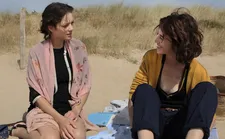 |
| Mathieu Amalric on another opportunity: "The second chance is not with the phantom. Arnaud Desplechin: It's not with Carlotta (Marion Cotillard), it's with Sylvia (Charlotte Gainsbourg)." |
MA: A second chance in life, too. Those two persons have their age and can live something. They can go and get rid of the phantom. Because it could be a comedy of remarriage. That's why as a spectator you think: Is it good that they come back together? Is that the story, the compulsion, the melo, the comédie sentimentale? Oh it's beautiful, they're going to love each other again? No, it's not there. It's somewhere else.
AKT: And she, as the ghost, is discarded. Carlotta is in a way free-floating in her ghostliness. You abandon her!
MA: She goes to the father [Henri Bloom played by László Szabó] after!
AKT: She [Carlotta] is wearing the white coat from Vertigo, he is in the Walter Benjamin arcades …
MA: She's there for the death of the father.
AD: And she is reaching the father at the very end. I think that's something that she learned on the island. She came to the island thinking, I want my husband back. Actually that's what you [to Mathieu] are saying to her on the beach. You say, no, "go and see your father." And she actually realises that he's right. First she is going to the administration, saying "Can I fix my marriage?" And they're saying "No, you can't." Now the question is where to go. And she goes to see her father, obviously the problem is with the father. You know, the love is shifting from the former husband, the character changes.
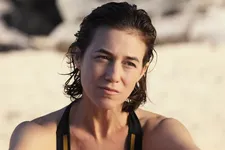 |
| Ismael's current girlfriend, astrophysicist Sylvia (Charlotte Gainsbourg) is visited by Carlotta. |
Instead of being devilish as she can be on the island, then she behaves like a saint. During the last scene with László when she is crying. There is this thing that I love with the character of Carlotta, it's that she's always on the side of life. I hope that I don't shock the audience with that. There's something very popular in France today in the newspapers - euthanasia is great. The best thing is to kill your father and mother. It's so great, it's so modern, it's so leftist, it's so cool, etc.. And the father is saying "Could this stop?"
But Carlotta who is always on the side of life says "It's not my job. I can't do that. I can't stop a life. Whatever the life's cost, I can't stop a life." I love the fact that it's politically absolutely incorrect. But she can't be part of the death of anything. That's what I love about the scene of the dance between Charlotte Gainsbourg and Marion Cotillard - is that Marion is on the side of life. And you just can't avoid that. It's just pure. She's just like if she was nine years old. Like a young dog, she's alive.
AKT: It's funny that you put it this way. Charlotte's head gesture is also like a puppy who sees this dance. Just the slight tilt of the head - it's wonderful. The music - Grégoire Hetzel's music is great as always. There's a very amusing moment that I have not seen play out this way before. I've seen it the opposite way.
Mathieu, when you play the piano at the dinner early on. We see you playing and then the dinner continues, your music continues, but you're sitting there at the dinner table eating. It's a lovely switch from the diegetic to the non-diegetic.
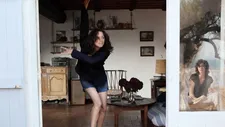 |
| Arnaud Desplechin on Marion Cotillard as Carlotta: "She's just like if she was nine years old. Like a young dog, she's alive." |
AD: Oh, yeah, yeah.
AKT: It's the opposite of Woody Allen's Bananas where he is in a hotel room and he suddenly hears a harp. He looks around and opens the closet where he finds the harpist sitting in the closet practicing. Were you playing with that?
AD: I like that. I think in all these scenes you have several levels of fictions. And one of the levels is the storytelling of this woman who is not young any longer is meeting this widower who is not young any longer and they are dealing with this idea - will we try a second chance? Can we afford a second chance or not? And all this story with the flashbacks which is always told from the woman's perspective, the woman's point of view, not the man's point of view.
I like that we can see you [Mathieu] play the theme from Marnie, the Hitchcock film. So you pan and you are on Charlotte's face. And it's Charlotte telling the story and saying he was provocative, etc. And after that we have the scene when you are quoting a poem at the table, etc.. But the music is on because she is not listening to you, she's just listening to the voice but not the meaning of your words.
AKT: "It's an homage to me if I had been my brother."
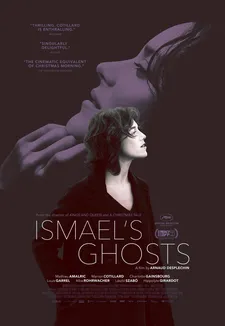 |
| Ismael’s Ghosts: Director’s Cut US poster |
MA: It's wonderful.
AKT: Did you embrace this line?
MA: Oh, all this and with the producer when we are commenting on the film.
AD: The film in the film!
MA: The film in the film. And so he has to seduce his producer. It's too far. When you see also the modesty of Ivan [Louis Garrel] when he arrives at the Ministère des Affaires étrangères. And I'm like, he could be more than that!
AD: You remember John Gielgud in Providence being annoyed with his character, saying, okay, why does my character behave like this? And being pissed against your character because your character starts to have a logic and you dismiss their logic. But their logic is stronger than yours because you are just the writer. They are the characters so they are stronger than you. That's what I love.
MA: So he imagined his brother dead and it's so moving. So he could do a good scene.
Read what Arnaud Desplechin and Mathieu Amalric had to say on what makes a good dreamer, never abandoning Vertigo, being blessed, disappearances and the experience of loss in Ismael’s Ghosts: Director’s Cut.
Read what Arnaud Desplechin had to say on Lacan, Rilke, Hitchcock, Philip Roth, and Ismael’s Ghosts: Director’s Cut.
Ismael’s Ghosts: Director’s Cut opens in the US on March 23.








